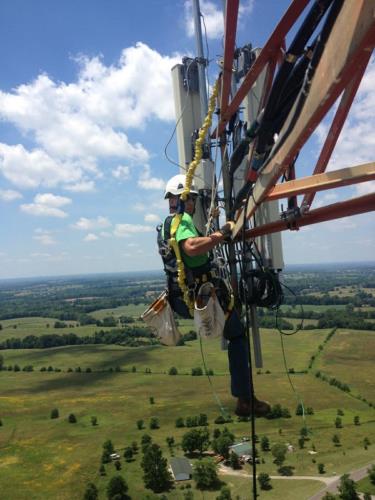 ElectricalConnection.org
ElectricalConnection.org
Connect with Us:
Facebook
LinkedIn
Twitter
YouTube
ST. LOUIS – “When career fairs resume, job seekers and businesses will have a greater appreciation for careers in the electrical industry – particularly communication technicians.” For Dennis Gralike, director of the IBEW/NECA Electrical Industry Training Center, this will be the year to emphasize the need for skilled communication technicians as businesses, schools and other industries adopt remote learning and working strategies to mitigate the spread of coronavirus. The training center is jointly operated by the International Brotherhood of Electrical Workers (IBEW) Local 1 and members of the St. Louis Chapter of the National Electrical Contractors Association (NECA), which form the Electrical Connection partnership.

“I think back to when IBEW/NECA invested millions of dollars to upgrade the training center in 1999 to fortify training in low voltage voice/video/data, the backbone of our connectivity today,” said Gralike. “While it defines much of what our communication technicians install, it’s still not well understood as work that our IBEW workforce is trained in and performs for a variety of industries”
In the last several; weeks, businesses, hospitals, schools and civic entities have had to rely on the connectability that skilled communication technicians provide. Social distancing and sheltering in place are a well established strategies to combat the spread of virus. On April 2, 2020, the St. Louis Post-Dispatch reported a strain on the region’s broadband capacity because so many people were connecting online.
“The communication technicians we produce at the training center are highly proficient at installing the backbone of local area networks and wide area networks that connect businesses internally and externally,” said Gralike. “That allows people to work or take classes from home or remotely. We offer blended learning here at the training center, offering classes in house and online. We want to encourage high school students and others to consider the importance of this highly complex construction work that we will become more dependent on in the future.”
Gralike notes that several hundred IBEW apprentices and journey workers are experiencing firsthand the value of communication technicians as they engage in remote learning while the training center temporarily suspends in-person classes due to the pandemic.
Currently, the training center has 63 telecommunications apprentices and several journey level communication technicians enrolled in continuing education classes. The 8,000 hours of training includes:
|
· Network Technologies; · Wide Area Networking; · Fiber Optics Technologies; · Structured Cabling; · CCTV and Surveillance Systems; · Green Building Fundamentals; and |
· Paging and Voice Evaluation; · Local Area Networking; · Nurse Call and Sound Reinforcement Systems; · Total Building Automation; · Building Information Modeling (BIM); · Test Instruments. |
“It’s more than just pulling cable,” noted Steve Potts, president of Primary Systems, which employs communication technicians in a number of its projects, many serving the healthcare industry. “We perform a full spectrum of integrated communications help hospitals improve the patient experience, optimize treatment, maximize productivity and track important data. We have three RNs on our staff to help guide us in future applications, which is especially valuable when hospitals have to deal with a health crisis.” Primary Systems installs integrated communication platforms for patient flow, clinical communications, nurse call systems, electronic medical records, supply records and more.
The Electrical Connection is a partnership of the International Brotherhood of Electrical Workers (IBEW) Local 1 and the St. Louis Chapter of the National Electrical Contractors Association (NECA). It represents more than 5,000 highly skilled and safe IBEW electricians and the more than 150 NECA electrical contractors who employ them. For more than 75 years, the IBEW/NECA Joint Apprenticeship Training partnership has trained more electricians/communication technicians than any education program in Missouri. Its award winning work provides safe and reliable electrical construction, maintenance, repair and replacement services across Missouri, the nation and the world. Learn more at www.electricalconnection.org.
Recent News